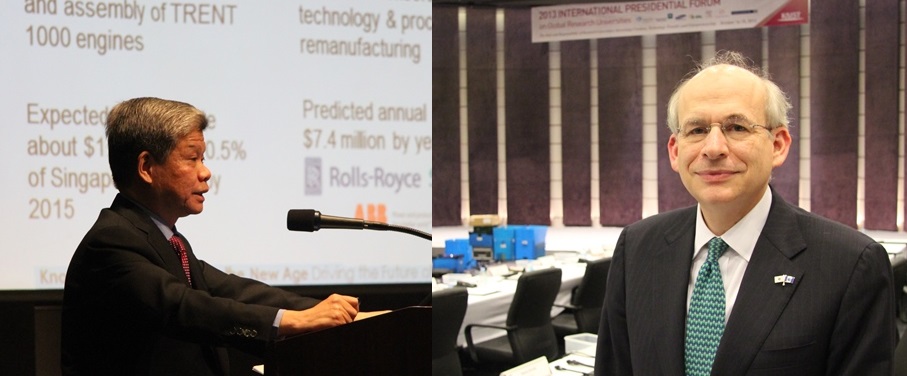On October 15, The KAIST Herald met with two of IPFGRU participants President of Rice University, United States David W. Leebron, and Chief of Staff and Co-Chair of the Advanced Remanufacturing & Technology Center of Nanyang Technological University, Singapore Lam Khin Yong.

Could you please briefly introduce yourself?
[Leebron] I am David Leebron, President of Rice University in Houston, Texas.
[Lam] I am Lam Khin Yong, Chief of Staff and Co-Chair of the Advanced Remanufacturing & Technology Center at Nanyang Technological University. The center is set up in partnership between NTU and the National Research Foundation, and an industrial collaboration with Rolls-Royce.
How does this year’s theme relate to your university?
[Leebron] All of us, who are research universities, make knowledge that can make difference to people’s lives. That requires translating that knowledge to meaningful partnerships with industries.
[Lam] NTU has embraced the model of university and industry cooperation, and sought to advance its research interests through close collaborations with various industry partners in significant project areas.
On surface, Massive Online Open Courseware (MOOC) seems to be the perfect means to create knowledge. As the president of Rice University, what could be the underlying potential danger of MOOCs?
[Leebron] There is a threat to universities because MOOCs require us to be much better in what we do, or else no one will pay to come to universities. Effect will be good to universities and their students; for example, students can gain greater leadership and communication capabilities, experience in design and engineering, and development of entrepreneur spirit - not just the value of the degree that you get at the end. Physical universities are going to have distinctive roles and do more than instill knowledge in students. Engineering education is an especially great education; it has challenges and failures. Sometimes you have a project [where when] you put them together, it just does not work. Working in a real laboratory and designing something is very different from doing things online. [That is why] students should go to physical universities.
As the co-chair of Advanced Remanufacturing & Technology Center, could you tell me what kind of role and responsibility NTU takes to promote innovation?
[Lam] NTU has a focus on upstream basic science. But in addition to that, we also see working with industries very important, especially in the innovation process. If companies and universities can properly plough up the research proposal at the beginning, then both the company and the university can win. The university will continue the basic research, while the company’s involvement from day one gives the chance for technology adoption.
For example, our program with Rolls-Royce conducts basic research with 40 doctorate students trained under the program. So, we expect a high quality, impactful publication of the results. At the same time, because of the involvement of Rolls-Royce, we expect some of the research results to fit into the Rolls-Royce new engine development in Singapore.
We have many programs to support research and entrepreneurship development. We are linked up with Kauffman Foundation in the United States - we send our students to the United States for entrepreneurship training every year.
Do you have any comments for KAIST students?
[Leebron] I think KAIST is an extraordinary institution [that grew] in a relatively short time. Continue to try to learn broadly; expose yourself to knowledge outside your discipline; take courses that are not necessarily close to your major; read literature [to] become more imaginative and creative.
[Lam] I am very pleased that NTU and KAIST are both ranked number one in the world for industry income and innovation of the Times Higher Education World University Rankings.
NTU has a very strong exchange program in undergraduate level with Korean universities including KAIST. The exchange students can be [assigned] to professors [and work] on the research part they are interested in. We welcome KAIST students to NTU.
Seung Hyun Suh Staff Reporter
hyunsuh@kaist.ac.kr

